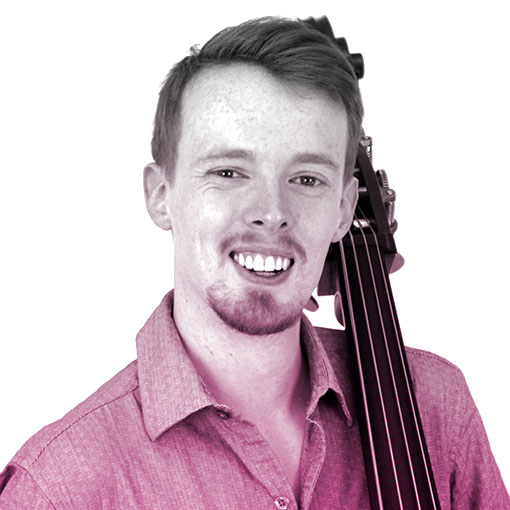Biography
I often tell people that you don’t choose the bass, it chooses you. And typically for many of my colleagues, this rings true. It was always assumed that I would pick up an instrument because my mother was a primary school music teacher, and my three older siblings were all playing them. But when I was ten years old, and the time to pick instruments arrived, I was given a violin! I had chosen bass, but they decided I was too small and the instruments too scarce, so I had to carry forward on the violin. This is until four years later when one of the bassists in the school orchestra moved away, and the other was kicked out due to poor behaviour, leaving no one left in the section at all! So I answered the call and grabbed a bass.
I took to it quickly, and after learning some fundamentals of the instrument with jazz bassist Cameron Brown, I began studying with former New York Philharmonic bassist William Blossom. Mr Blossom showed me the awesome world of orchestral music through study of the classic works, in lessons sometimes going over for an hour or more. Eventually, I chose to pursue this passion into college and was accepted to study at SUNY Purchase with current New York Philharmonic principal Timothy Cobb, who I also continued on with at Manhattan School of Music for my master’s degree.
Following my undergrad, I was offered the opportunity to join Bard College for their conservatory’s tour of central and eastern Europe as an extra musician. This journey took me through seven countries, including Russia, and prior to this, I had never even flown on a plane! But now, I was in a karaoke bar in Saint Petersburg at 5.00am, watching some Russian metalheads perform their rendition of Limp Bizkit “hits”. I’ve always loved music because of its ability to bring people from different backgrounds together, and this trip really opened my mind to the places, no pun intended, where music can bring me. I was hooked.
After that summer, I moved to New York City to begin working towards my master’s degree. That time living and studying in the city turned out to be pivotal in developing into the player and person I am now. It provided me with a very concentrated musical experience that few in other cities and schools experience. I was fortunate to perform in masterclasses for visiting musicians such as Enrico Fagone, Scott Pingel, Jeff Turner, as well as observe additional classes at MSM and the other NYC conservatories. Being able to hop on a short subway ride and see a show by the Metropolitan Opera, New York Philharmonic, or any myriad of visiting orchestras was a phenomenal learning experience as well. I also took advantage of many freelance performance opportunities in the city, which allowed me to become familiar with a lot more repertoire than if I had only been in school.
During this era, while attending the DCBass workshop in Washington, D.C., there was an additional watershed moment in my personal development and playing. My education up until that point was very traditional, and this workshop offered me the chance to study with two younger bassists from The National Symphony Orchestra, Ira Gold and Paul DeNola. They introduced me to another approach to the instrument, which combined with what knowledge I had already acquired, really empowered me to become a better musician and person.
From there, I finished at Manhattan School of Music and moved on to pursue additional studies at Bard College with Metropolitan Opera Associate Principal Leigh Mesh, who also instilled his own unique approach and technique into my playing. It is during this, that brings me to applying into Southbank Sinfonia and writing this biography right now. Another city, and another new experience that I am grateful for and excited to take part in!
EDUCATION
Bard College
New York, USA
Manhattan School of Music,
New York, USA
Purchase College, State University New York
New York, USA
QUICKFIRE QUESTIONS
What do you love about classical music?
I think I’ve always been drawn to music because it says what words can’t. I’ve never been drawn to lyrics, for whatever reason. Of course lyrics can be beautiful poetry, and are an art-form in themselves, but I feel sometimes lyrics guide you to feel a certain way, while the absence of them allow you to think and feel whatever range you want. Two audience members can both take something different from a concert, perhaps one tragic and one hopeful, depending on their life
situation or how they feel that day. Maybe a third just appreciates the aesthetic of the art. None of them are wrong, and that’s part of the beauty of classical music.
What’s on your playlist right now?
I go through phases across a variety of genres. Lately there’s been a lot of R&B (e.g., Aretha Franklin, Marvin Gaye, Al Green), Chris Thile, Mac DeMarco, and the Mahler symphonies.
